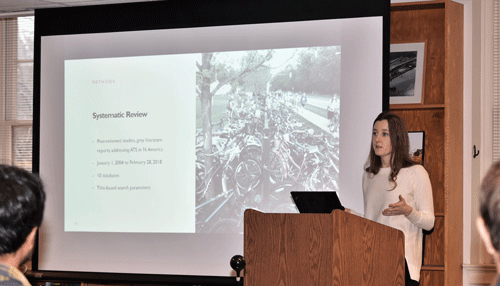
Mary Wolfe is interested in how people interact with their living environment. Her research focuses on how those interactions are reflected in the health outcomes of a community, particularly when transportation barriers to health care exist.
In the field of transportation planning, research on health outcomes often involves questions related to walking, biking and increasing physical activity through planning for these modes. While Mary, a doctoral student at the University of North Carolina at Chapel Hill, has studied these planning issues, she has also taken a different approach to transportation and health. She wanted to know how people travel to and from their medical appointments, and what happens when a lack of transportation is the only thing coming between a person and their health care provider.
“From a clinician perspective, transportation barriers are commonly cited as reasons for missed or delayed appointments,” she said. “I was eager to explore this problem empirically through a planning lens in a way that expanded how we commonly think about transportation and health.”
STRIDE Project A2 titled “Changing Access to Public Transportation and the Potential for Increased Travel” provided the perfect substrate to search for her questions. This multi institutional project, led by Dr. Kari Watkins of Georgia Tech with participation from Dr. Ruth Steiner of the University of Florida and Dr. Eleni Bardaka of North Carolina State University, had several parts to it. Mary’s work under the University of North Carolina at Chapel Hill led by her adviser, Dr. Noreen McDonald, focused on researching how technological advances related to shared mobility are reshaping paratransit and dial-a-ride services in the US.
For the project, Mary and Dr. McDonald used nationally representative health data to document the prevalence of transportation barriers to care nationally. They then conducted a nationwide review of emerging healthcare transportation services and developed a typology of innovative healthcare mobility strategies. They also leveraged Durham, NC as a case study to assess motivations among transit agencies and health care providers to embrace innovation in paratransit provision.

Important findings from her work point to a significant problem in transportation access to healthcare nationally. A total of 5.8 million Americans delayed medical care in 2017 because they did not have transportation. Also, in a nationwide review she was able to identify three major types of innovative transportation to health care: 1) healthcare providers leveraging ridesourcing technology, such as Uber and Lyft, to book rides for patients; 2) insurers formally partnering with a ridesourcing company to expand transportation offerings to their beneficiaries; and 3) paratransit providers offering Uber and Lyft trips through pilot projects. The good news is that in many of these cases, people who previously did not have access to ridehailing apps were gaining access for the first time.
So, what do these findings mean to society in general and to the transportation and planning field? Mary hopes their work will serve to shed light on ridesourcing technology.
“We hope that our work helps to demystify this new and rapidly evolving area of on-demand transportation offerings, especially as it relates to potentially addressing transportation barriers to care,” she said. “Our research offers some structure and language for patients, care coordinators, healthcare providers, and transportation planners who are curious about what these new services might mean for them. While ridesourcing options are certainly not a silver bullet to barriers to care, I’m glad that the conversation around social determinants of health—like transportation—is gaining traction and focused on solutions.”
As for her involvement with the STRIDE Center, she says she is grateful for the support it has provided to her dissertation research. Through this project, Mary says she has connected with researchers in disciplines from engineering to public health, and engaged in several collaborations with clinicians.
“STRIDE is really great at facilitating cross-disciplinary work, and it has been these types of collaborations that have been most rewarding in my Ph.D. training,” she said.